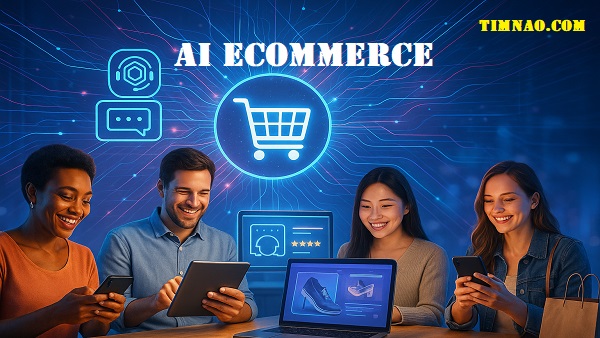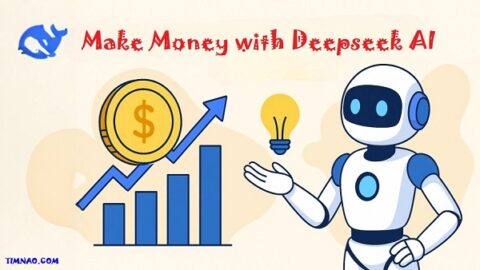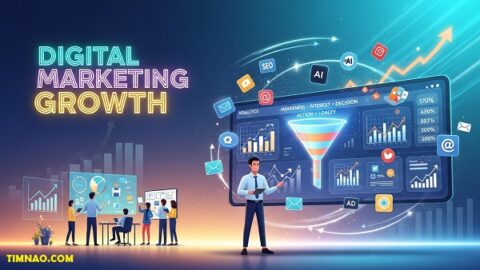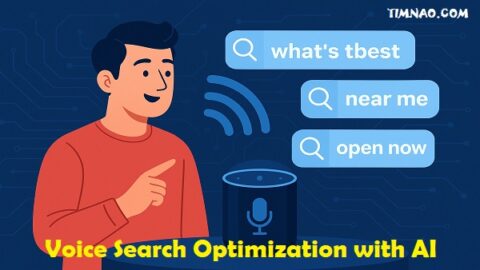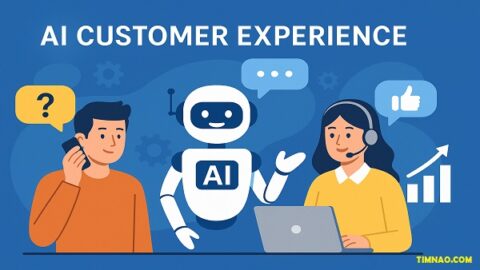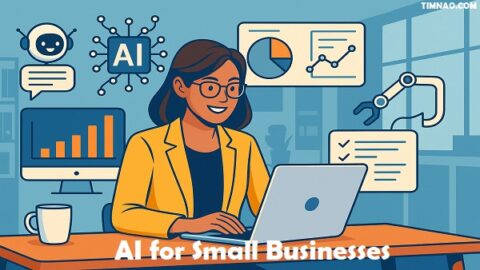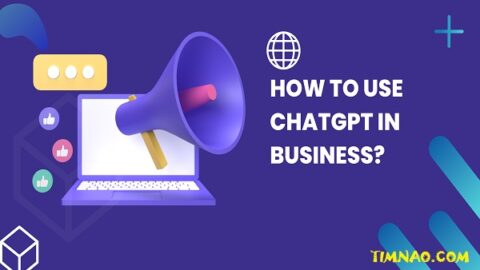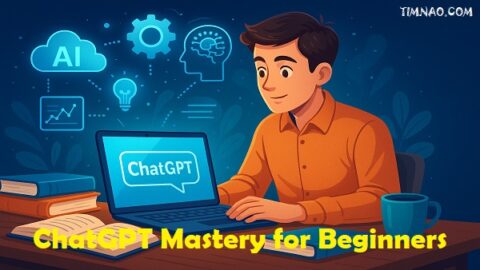Unlock Explosive Growth: Mastering AI Ecommerce with ChatGPT in 2025
The world of ecommerce is no longer just about online storefronts and digital transactions. We’re standing on the cusp of a revolution, a paradigm shift powered by Artificial Intelligence (AI), and more specifically, conversational AI like OpenAI’s ChatGPT. If you’re an aspiring entrepreneur dreaming of launching your online empire, or an established ecommerce veteran looking to scale new heights, understanding and harnessing the power of AI Ecommerce isn’t just an option—it’s the key to unlocking explosive growth and future-proofing your business.
AI Ecommerce is here, and it’s reshaping everything from how you find products and understand your customers to how you create compelling marketing campaigns and provide stellar customer service. This isn’t some far-off futuristic concept; it’s happening now, and businesses that adapt and integrate these technologies are poised to dominate the digital marketplace. The global AI-enabled e-commerce market is already booming, projected to hit staggering figures in the coming years. This guide will be your companion in navigating this exciting new landscape, making “Mastering Ecommerce with AI and ChatGPT” an achievable reality for your online dreams.
📚 Table of Contents
- 🚀 The New Reality: Launching and Thriving in AI Ecommerce
- 🌊 Diverse Ecommerce Models in the AI Era
- 📢 AI-Powered Sales Channels: Expanding Your Reach
- 🎨 Building Your AI-Optimized Website
- 📣 AI in Digital Advertising, Marketing & SEO
- 📈 Scaling Your AI Ecommerce Empire
- ❤️ Cultivating Customer Loyalty in the Age of AI
- 🌟 The Future is Now: Don’t Get Left Behind
🚀 The New Reality: Launching and Thriving in AI Ecommerce
Starting an ecommerce business in 2025 and beyond means embracing AI from day one. Let’s dive into how AI, especially tools like ChatGPT, changes the game.
Dispelling Myths: The Real Work Behind AI Ecommerce Success
The allure of AI might paint a picture of instant riches with minimal effort. However, let’s be clear: AI Ecommerce is not a get-rich-quick scheme. While AI tools like ChatGPT can automate tasks, generate content, and provide incredible insights, they are powerful assistants, not magic wands. Building a successful online business still demands strategic thinking, market research, dedication, and hard work. The difference is, AI can make these processes significantly more efficient and effective. Forget the gurus promising overnight success; true achievement in AI Ecommerce comes from intelligently applying these tools to amplify your efforts.
Beyond the Hype: Making AI Work for Your Lifestyle & Business 🧘♀️
The beauty of an AI Ecommerce venture is its potential for flexibility, but this requires careful planning. Before diving in, consider:
- Your Passions and Interests: What genuinely excites you? Building a business around your interests can provide intrinsic motivation. ChatGPT can help you explore niches related to your passions by brainstorming product ideas or analyzing market viability for those interests.
- Your Skill Set: Honestly assess your strengths and weaknesses. AI can help bridge skill gaps. For instance, if you’re not a strong writer, ChatGPT can draft product descriptions or blog posts. If data analysis isn’t your forte, AI tools can help you understand market trends.
- Time Commitment: Be realistic about the time you can dedicate. While AI streamlines many tasks, the initial setup and strategic oversight still require significant input.
- Operational Space: If selling physical goods, where will you store inventory? AI can help optimize inventory management, but physical space is still a consideration unless you opt for models like dropshipping.
Aligning your AI Ecommerce business with your lifestyle and skills from the outset will set you on a path to sustainable success and enjoyment.
Smart Product Selection in the Age of AI 💡
Choosing the right products is fundamental to your ecommerce success, and AI can be a powerful ally in this process. Your products define your target audience, brand identity, and competitive landscape.
- Understanding Your Audience with AI: AI tools can analyze vast amounts of data to help you understand customer demographics, preferences, and buying habits with much greater accuracy than ever before. This allows you to select products that truly resonate.
- AI for Brand Identity and Positioning: The products you sell contribute significantly to your brand’s identity. AI can help analyze how different product choices might affect brand perception and ensure consistency in your messaging.
- Navigating the Competitive Landscape with AI: AI-powered competitive analysis tools can provide deep insights into what your competitors are selling, their pricing strategies, and customer reviews. This helps you identify gaps in the market and opportunities for differentiation.
Unearthing Winning Products with AI Insights 🔍
Finding products that will actually sell and be profitable is a critical first step. AI and various online platforms offer innovative ways to source products:
- Wholesale Suppliers & Manufacturers: Platforms like Alibaba and ThomasNet remain key, but AI can help analyze supplier reliability and product trends from these vast marketplaces.
- Dropshipping with AI Efficiency: Services like those compatible with Shopify (formerly using Oberlo as an example) can be made even more efficient with AI-driven product research tools that identify trending dropshipping items.
- Private Labeling & AI-Generated Branding: AI tools can help design logos, generate brand names, and even draft initial marketing copy for your private label products.
- Print-on-Demand (POD) & AI Designs: Combine POD platforms (e.g., Printful, Printify) with AI image generation tools to create unique designs for apparel, home goods, and more.
- AI for Analyzing Market Trends: Leverage AI to analyze emerging trends and consumer needs, helping you innovate and develop unique products. Recent statistics show that online shopping continues its massive growth trajectory, with categories like electronics, fashion, and food leading the charge, but AI can help uncover profitable niches within any category.
The AI Ecommerce Power Trio: AI, Automation, and Your Store ❤️
AI and automation are not just buzzwords; they are the engine of modern AI Ecommerce. This synergy drives efficiency, scalability, and personalized customer experiences crucial for survival and growth. Automation, in essence, is using technology to perform tasks with minimal human intervention, from inventory management to customer service.
Mastering Prompts: Your Key to Unlocking ChatGPT’s Potential for Ecommerce 🔑
A chatbot like ChatGPT is a powerful conversational AI. To get the most out of it, you need to master the art of writing effective prompts—your requests or questions.
- Clarity is King: Be clear, concise, and specific. Instead of “Tell me about marketing,” ask “Develop a 3-month social media marketing plan for a new online store selling handmade vegan soaps, targeting eco-conscious millennials in the US.”
- Provide Context: Refer to previous parts of your conversation to help the AI understand the flow and tailor responses better.
- Specificity Matters: The more detail you provide, the more tailored and useful the response will be.
- Iterate and Refine: Don’t expect the perfect answer on the first try. Refine your prompts based on the responses you get.
Think of ChatGPT as your tireless virtual assistant; clear instructions will yield the best results.
Why AI is an Ecommerce Business’s Best Friend 🤖
Ecommerce businesses are uniquely positioned to benefit from AI and automation due to:
- High Volume & Scalability Needs: AI can handle thousands of transactions and customer interactions seamlessly, allowing your business to scale without a proportional increase in manual labor.
- Customer Expectations: Modern shoppers expect speed, efficiency, and personalized experiences—all areas where AI excels, from instant chatbot responses to tailored product recommendations.
- Data-Driven Decisions: Ecommerce generates vast amounts of data. AI can process this data quickly to provide actionable insights for optimizing inventory, marketing, and customer experience.
- Cost Reduction: Automating repetitive tasks reduces labor costs and minimizes human error.
- Enhanced Personalization: AI enables hyper-personalization at scale, boosting customer satisfaction and loyalty.
- Global Expansion: AI can help with language translation, currency conversion, and understanding local market preferences, facilitating international growth.
Smart Outsourcing and Optimization with AI 🌍
You don’t have to do everything yourself. Platforms like Upwork and Fiverr offer access to a global pool of freelancers for tasks like web development, content creation, and digital marketing. AI can even help you draft job descriptions for these platforms or manage outsourced projects more effectively.
Automated online services are also key:
- Website Builders: Platforms like Shopify and WordPress (with WooCommerce) offer user-friendly tools, increasingly integrated with AI features.
- Marketing Automation: Tools like Mailchimp and HubSpot use AI to automate email campaigns and personalize customer journeys.
- Inventory Management: AI-powered software can automate inventory tracking and order fulfillment.
Essential AI-Powered Tools for Ecommerce Domination 🛠️
Your AI Ecommerce “software stack” will be a collection of tools. Beyond your core ecommerce platform (like Shopify, BigCommerce, Adobe Commerce (Magento), or WooCommerce), consider:
- SEO Tools with AI: Semrush, Ahrefs, and newer AI-driven tools like Surfer SEO help optimize your content and website for search engines.
- AI for Paid Advertising: Platforms like Google Ads and Meta Ads Manager are increasingly using AI to optimize campaigns. AI tools can help analyze ad performance and suggest improvements.
- AI-Enhanced Content Creation: Jasper.ai (formerly Jarvis.ai) and Copy.ai leverage AI to generate product descriptions, blog posts, and ad copy.
- Personalization Engines: Tools like Clerk.io or Nosto use AI to analyze customer behavior and deliver real-time personalized product recommendations.
- Customer Support Chatbots: ChatGPT and specialized chatbot platforms (e.g., Elfsight AI Chatbot) can handle a large volume of customer inquiries 24/7.
20 Revolutionary Ways ChatGPT Can Catapult Your Ecommerce Growth (Updated for 2025) 🚀
ChatGPT is more than just a content writer. Here’s how it can supercharge your AI Ecommerce business:
- Hyper-Personalized Customer Service: 24/7 AI chatbot for tracking orders, FAQs, and issue resolution.
- Engaging Product Description Generation: Create unique, SEO-friendly descriptions in various tones.
- Automated & Personalized Order Updates: Keep customers informed via email/SMS.
- Customer Feedback Collection & Sentiment Analysis: Understand customer opinions and identify trends.
- In-Depth Market Research: Analyze industry trends, competitor strategies (with ethical boundaries).
- Content Creation Engine for Blogs & Articles: Generate ideas, outlines, and even full drafts to boost SEO and engagement.
- Dynamic Email Marketing Campaigns: Craft compelling, personalized email copy for different audience segments.
- Social Media Content & Management: Create posts, respond to comments, and maintain an active presence.
- AI-Powered Virtual Shopping Assistant: Guide customers with recommendations based on preferences and history.
- Smarter Inventory Management Insights: While not directly managing, ChatGPT can help analyze data to predict needs or draft reorder requests.
- Sales Trend Analysis & Forecasting: Help interpret sales data to predict future trends for better planning.
- Personalized Customer Loyalty Programs: Draft tailored communications and reward ideas.
- Comprehensive FAQ & Knowledge Base Creation: Compile and update support documentation efficiently.
- Multilingual Content Translation & Localization: Adapt your store for global audiences.
- Intelligent Upselling & Cross-selling Scripts: Develop effective prompts for checkout or post-purchase recommendations.
- Streamlined Return Process Management: Draft clear instructions and automated responses for returns.
- Employee Training Material Development: Create onboarding guides and product knowledge modules.
- Competitor Analysis Summaries: Help synthesize publicly available competitor information.
- Event Planning & Promotion Assistance: Draft event descriptions, invitations, and follow-up messages.
- Interactive Content Creation (Quizzes/Guides): Design engaging quizzes to help customers find perfect products.
Making Your AI-Powered Cash Register Ring 💰
Ultimately, all these efforts are about driving sales. Key strategies include:
- Deeply Understanding Your Audience with AI: Tailor marketing and product offerings.
- AI-Optimized User Experience (UX): Ensure your website is easy to navigate, fast-loading, and mobile-friendly. AI tools can analyze user behavior to suggest UX improvements.
- Leveraging AI in Digital Marketing:
- SEO: AI helps identify keywords, optimize content, and analyze performance.
- Content Marketing: Generate high-quality, relevant content with AI assistance.
- Social Media Marketing: AI can schedule posts, analyze engagement, and help create targeted ads.
- Email Marketing: Personalize campaigns and automate sends with AI.
- PPC Advertising: AI algorithms in platforms like Google Ads optimize bids and targeting.
- Dynamic Pricing Strategies with AI: Adjust prices based on demand, competition, and customer behavior using AI tools.
- AI-Enhanced Customer Service: Provide quick, efficient support via chatbots and AI-assisted human agents.
- Utilizing Analytics (AI-Powered where possible): Track performance, understand customer behavior, and make informed decisions using tools like Google Analytics (part of Google Marketing Platform) and Microsoft Clarity.
Prioritizing for Impact in Your AI Ecommerce Strategy 🎯
With so many possibilities, it’s crucial to prioritize tasks that deliver the most value. Focus on your “A-list”—activities that directly drive growth, improve customer experience, or enhance efficiency. AI can help analyze the potential impact of different initiatives, aiding in strategic decision-making.
🌊 Diverse Ecommerce Models in the AI Era
AI’s versatility means it can enhance various types of ecommerce businesses.
B2C vs. B2B Ecommerce: Tailoring AI Strategies 🛍️
- Business-to-Consumer (B2C): AI excels at personalizing the shopping experience for individual consumers, from product recommendations to targeted marketing. ChatGPT can craft engaging, emotional copy that appeals to B2C buyers.
- Business-to-Business (B2B): AI can streamline complex B2B sales cycles, automate quote generation, manage client relationships through AI-powered CRMs, and personalize offerings for business clients. ChatGPT can help draft professional proposals and communication.
Physical vs. Digital Goods: AI in Inventory and Delivery 💻
- Physical Goods: AI revolutionizes inventory management by predicting demand, optimizing stock levels, and even planning efficient shipping routes. For warehouse logistics, AI-powered robots and systems are becoming more common.
- Virtual Goods: For digital products like software, e-books, or online courses, AI can personalize user experiences, recommend relevant content, and automate customer support for technical queries. AI can also help protect digital assets from piracy through advanced DRM solutions.
Inventory Deep Dive vs. Dropshipping Freedom: AI’s Role 🚚
- Managing Own Inventory: AI tools provide precise demand forecasting, reducing overstocking or stockouts. ChatGPT can help draft inventory status reports or alerts.
- Dropshipping: AI can identify profitable dropshipping products, monitor supplier reliability, and automate order processing with dropshipping partners.
Order Fulfillment: AI-Optimized Outsourcing or DIY? 📦
- Outsourcing Fulfillment (3PL): AI can help you choose the best 3PL provider by analyzing their performance data and costs. It can also optimize communication and data exchange with your chosen partner.
- In-House Fulfillment: AI can optimize warehouse layouts, picking routes, and staffing schedules. AI-powered visual inspection can improve quality control during packing.
The Long Tail Revisited: AI and Niche Market Domination 🎣
The “Long Tail” concept—selling a large number of unique items in small quantities—is supercharged by AI. AI can:
- Identify countless niche product opportunities.
- Generate optimized listings for a vast catalog of items.
- Personalize recommendations to connect buyers with obscure or niche products.
- Automate marketing for these diverse items at scale.
📢 AI-Powered Sales Channels: Expanding Your Reach
Your ecommerce strategy will likely involve multiple sales channels. AI can optimize your presence across all of them.
Your Website: The AI-Enhanced Core of Your Ecommerce Universe 🌐
Your website is your central hub. AI enhances it by:
- Personalizing the User Experience: Tailoring content, product recommendations, and offers in real-time.
- Powering Intelligent Search: AI-driven search functions understand natural language and user intent better.
- Optimizing for Conversions (CRO): AI tools can A/B test website elements, analyze user behavior with heatmaps (Microsoft Clarity offers this), and suggest improvements to boost conversion rates.
- Generating Website Content: Using ChatGPT for blog posts, FAQs, and landing page copy.
Conquering Marketplaces (Amazon, Walmart, eBay) with AI 🛒
Selling on large marketplaces like Amazon, Walmart, and eBay involves navigating their specific algorithms and intense competition. AI can help by:
- Optimizing Product Listings: AI tools can tailor descriptions and keywords for each marketplace’s search algorithm.
- Dynamic Pricing: Adjusting prices competitively in real-time based on competitor actions and demand.
- Managing Reviews: AI can help analyze customer reviews for insights and draft responses.
- Advertising Optimization: AI-powered tools can manage and optimize your ad campaigns on these platforms (e.g., Amazon Advertising).
Exploring Other Third-Party Marketplaces with an AI Edge 🌟
Beyond the giants, niche marketplaces like Etsy or specialized B2B platforms offer opportunities. AI can help identify relevant niche marketplaces, adapt your listings for their specific audiences, and manage inventory across multiple platforms.
The New Wholesale/Retail Frontier: Shopify Collective, Buddify, and AI 🤝
Platforms like Shopify Collective are changing how retailers and suppliers connect, facilitating easier product sourcing and selling between Shopify stores. AI can enhance these interactions by:
- Matching Suppliers and Retailers: AI algorithms could suggest optimal partnerships based on product catalogs, target audiences, and sales performance.
- Automating Onboarding: Streamlining the process of adding new products from collective partners to your store.
- Optimizing Shared Inventory Data: Ensuring real-time accuracy and communication.
Affiliate Marketing Supercharged by AI 🚀
Affiliate marketing can be a powerful revenue stream. AI can:
- Identify Potential Affiliates: Analyze social media and web content to find influencers and bloggers whose audience aligns with your brand.
- Personalize Outreach: Draft tailored messages to recruit affiliates.
- Generate Affiliate Content: Provide affiliates with AI-generated content ideas or draft promotional materials.
- Track Performance: AI analytics can help track affiliate performance and optimize commission structures.
🎨 Building Your AI-Optimized Website
Your website is where many of your AI strategies will come to life.
Marketing 101 for AI Ecommerce: Define Your Niche & Know Your Audience 🎯
Even with AI, fundamental marketing principles apply. Defining your niche and understanding your target audience are crucial first steps. AI enhances this by:
- Niche Identification: Analyzing market data, social trends, and search queries to identify underserved or profitable niches. ChatGPT can brainstorm niche ideas based on your interests and initial research.
- Audience Understanding (Buyer Personas): AI can process vast amounts of customer data (demographics, behavior, psychographics) to create highly detailed and accurate buyer personas. This allows for truly personalized marketing and product development.
Spying (Ethically!) on the Competition with AI 🕵️♂️
Understanding your competitors is vital. AI tools like Semrush or Ahrefs, combined with ChatGPT’s analytical capabilities, can help you:
- Analyze Competitor SEO & Content Strategies: Identify their top keywords, best-performing content, and backlink sources.
- Monitor Pricing & Promotions: AI can track competitor pricing in real-time.
- Gauge Customer Sentiment: Analyze reviews of competitor products to find their weaknesses and your opportunities.
- Website Technology: Some tools or manual inspection can reveal what ecommerce platform (e.g., Shopify, Magento) or tools competitors are using.
AI in Graphic Design, Branding, and User Interface (UI) 🖌️
First impressions are critical online. While AI might not replace human designers entirely, it can:
- Generate Design Ideas: AI tools can create mood boards, color palettes, and initial logo concepts.
- Automate Basic Design Tasks: Creating social media graphics or simple banners.
- Personalize UI: AI can adapt the website layout or content displayed based on individual user behavior.
- Harmonize Copy and Images: ChatGPT can write compelling copy that complements your visuals, ensuring a cohesive brand message.
Smart Website Taxonomy with AI 📂
A clear website structure (taxonomy) is crucial for user experience and SEO. AI can help:
- Suggest Categories & Subcategories: Based on your product list and keyword research.
- Automate Product Tagging: Ensuring products are easily discoverable.
- Optimize Navigation: Analyzing user flow to suggest improvements for intuitive navigation.
Gathering, Creating, and Generating Content with ChatGPT & AI ✍️
Content is king, and AI is your royal scribe.
- Product Descriptions: ChatGPT can generate unique, engaging, and SEO-optimized descriptions at scale, drawing from supplier information or basic product features.
- Blog Posts & Articles: Generate topic ideas, outlines, or even first drafts for your ecommerce blog, boosting SEO and engaging customers.
- Videos, Spec Sheets, Comparison Charts: AI can help script videos, format spec sheets from raw data, and create comparison charts by extracting and structuring product information.
- Human Oversight is Key: Always review and edit AI-generated content to ensure accuracy, brand voice, and originality. AI is a tool to assist, not replace, human creativity and judgment.
📣 AI in Digital Advertising, Marketing & SEO
Driving traffic and converting visitors is where AI truly shines in ecommerce.
Crafting Your Marketing Plan with ChatGPT 📈
ChatGPT can be an invaluable assistant in developing your marketing plan:
- Market Research & Analysis: Prompt ChatGPT to analyze trends, competitor strategies, and consumer preferences.
- Target Audience Identification: Use it to flesh out detailed buyer personas.
- Brand Positioning & Messaging: Generate compelling brand statements and key messages.
- Marketing Channel Selection: Ask for recommendations on the most effective channels for your niche and budget.
- Campaign Idea Generation: Brainstorm creative campaign themes and promotional offers.
“Going Au Naturel”: Organic Listings & AI-Powered SEO 🌿
Natural search listings are highly credible and drive significant traffic. AI is revolutionizing SEO:
- AI Keyword Research: Discovering high-intent long-tail keywords and semantic variations.
- AI Content Optimization: Tools analyze top-ranking content and provide recommendations to improve your own (e.g., using relevant entities, improving readability).
- Technical SEO Audits with AI: Identifying site speed issues, crawl errors, or mobile usability problems.
- Automating SEO Tasks: AI tools can help automate reporting, rank tracking, and even some aspects of link building outreach.
- **Platforms like Google Search Console and Google Analytics provide essential data, and AI can help you interpret this data more effectively.
Pay-Per-Click (PPC) Advertising Amplified by AI 💸
PPC platforms like Google Ads and Meta (Facebook/Instagram) Ads heavily utilize AI for:
- Automated Bidding Strategies: AI algorithms adjust bids in real-time to maximize conversions or ROI.
- Audience Targeting: AI helps identify and reach the most relevant audiences.
- Ad Creative Optimization: Some AI tools can generate ad copy variations or even suggest visual improvements.
- Performance Prediction: Forecasting campaign outcomes based on historical data.
Feeding the Engines: AI and Product Feed Automation 🤖➡️📊
For selling on Google Shopping, Facebook Shops, and other marketplaces, product feeds are essential. AI can:
- Automate Feed Creation & Optimization: Ensuring your product data is accurate, complete, and formatted correctly for each channel.
- Enhance Product Attributes: AI can enrich product titles and descriptions within feeds for better visibility.
- Error Detection: Identifying issues in your feeds that could lead to disapproval.
The Generative Search Revolution: Google Gemini & Bing Copilot 🧠
Search is evolving with generative AI. Google’s Gemini and Microsoft’s Bing Copilot are integrating AI to provide more conversational and comprehensive search experiences. For AI Ecommerce:
- This means users might get product recommendations and comparisons directly within the search results.
- Optimizing your product data and content for these AI-driven search experiences will be crucial. Think rich, detailed descriptions, structured data, and answering potential customer questions comprehensively.
- GEO-targeting combined with generative search can offer hyper-localized product suggestions and offers.
Don’t Forget the Blog: AI for Engaging Content Marketing 🔥
A blog is a powerful tool for SEO, customer engagement, and building authority. ChatGPT can:
- Generate blog post ideas relevant to your niche.
- Create detailed outlines.
- Draft entire articles (which you should then edit and personalize).
- Optimize blog content for specific keywords.
Leveraging Email Marketing with AI Precision 📧
Email remains a high-ROI channel. AI enhances it through:
- Personalized Email Content: AI can tailor subject lines, product recommendations, and promotional offers within emails based on individual subscriber behavior.
- Automated Email Campaigns: Triggering emails based on customer actions (e.g., abandoned carts, post-purchase follow-ups).
- Optimizing Send Times: AI can predict the best time to send emails for maximum open rates.
- Crafting Email Copy: Use ChatGPT to write engaging newsletter content, promotional emails, and transactional messages.
📈 Scaling Your AI Ecommerce Empire
Once you’ve laid the foundation, AI is crucial for scaling efficiently.
Planning to Scale with Technology 🏗️
Choose scalable ecommerce platforms (Shopify, BigCommerce, Magento are often cited for scalability) and integrate AI tools that can handle increasing volumes of data, transactions, and customer interactions without a linear increase in costs or manual effort.
Protecting Your Brand: Trademarks & Copyrights in the AI Age ©️™️
As your brand grows, protecting your intellectual property (IP) is vital.
- Trademarks: Protect your brand name, logo, and slogans. Use tools like the USPTO database for searches.
- Copyrights: Protect your original content, including website copy, product descriptions (even if AI-assisted, the final unique version is yours), images, and videos.
- AI can help draft initial IP-related documents or search for potential infringements, but always consult with legal professionals for these matters.
Mastering Logistics & Operations with AI ⚙️
- Sales Tax Compliance: While complex, many ecommerce platforms and accounting software (like QuickBooks Online, Xero) offer automated sales tax calculations based on location.
- Accounting & Financial Management: Integrate your ecommerce platform with accounting software. AI features within these tools can help with financial forecasting and anomaly detection.
- Supply Chain Optimization: AI can analyze supplier performance, predict disruptions, and optimize inventory flow across your supply chain.
- Inventory Management & Demand Forecasting: AI excels at predicting demand based on historical data, market trends, and even external factors like weather or upcoming events, ensuring you have the right stock at the right time. This minimizes holding costs and prevents stockouts. Even with limited historical data, AI can leverage external data sources for better forecasting.
❤️ Cultivating Customer Loyalty in the Age of AI
Acquiring customers is one thing; keeping them is another. AI can foster deeper customer relationships.
Taking Care of Your Customers: Your Real MVPs 🏆
Excellent customer service, personalized experiences, and proactive communication are key to customer retention. AI enables this at scale by:
- Providing 24/7 Support: AI chatbots handle common queries instantly.
- Personalizing Interactions: Addressing customers by name, referencing past purchases, and offering relevant help.
- Predicting Customer Needs: AI can identify customers who might be at risk of churning and suggest proactive outreach.
Building a Thriving Social Media Presence with AI 📱
Social media is crucial for brand building and engagement. AI can:
- Content Creation & Scheduling: Generate post ideas, draft copy, and schedule posts across platforms like Facebook, Instagram, TikTok, and LinkedIn.
- Social Listening: Monitor social media for mentions of your brand and industry trends.
- Audience Insights: Analyze follower demographics and engagement to refine your strategy.
- Automating Responses: Handle common questions and comments.
🌟 The Future is Now: Don’t Get Left Behind
The integration of AI and tools like ChatGPT into ecommerce is not a fleeting trend—it’s the future unfolding before our eyes. From hyper-personalization and predictive analytics to automated content creation and intelligent customer service, AI Ecommerce empowers entrepreneurs to build smarter, more efficient, and more customer-centric businesses.
The journey to “Mastering Ecommerce with AI and ChatGPT” requires continuous learning, adaptation, and a willingness to experiment. Embrace the challenges, leverage the incredible power of these new technologies, and stay focused on providing value to your customers. Your online dreams are more achievable than ever before. Start building your AI Ecommerce future today!
Reference video:

